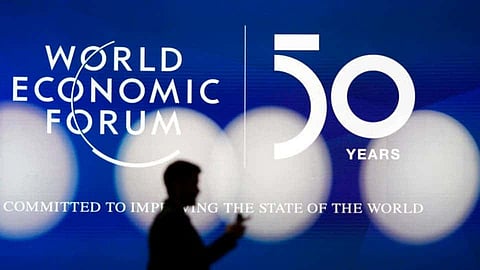

Economic growth in the Middle East "is no longer a question of if but when," the Saudi Arabian Minister of Communications and Information Technology Abdullah al-Swaha said during a panel discussion on the first day of the World Economic Forum in Davos, Switzerland.
The minister added that he is "very bullish on the region" and that it will "return to the days of growth".
The Middle East's key strength is its young, tech-savvy population, said al-Swaha.
The panel noted that key to leveraging this strength is the use of technology.
"Undoubtedly digitalization is the largest economic multiplier and social equalizer," said al-Swaha. Al-Swaha also added that the region was already making great strides in the field. Saudi Arabia is ranked third for framework for digital businesses among G20 countries, he noted.
To continue these successes, the Middle East region needs "to innovate and regulate" to secure its economic growth, he added.
However, panelists noted that this growth will not come easily.
"It's a reality that nine in every 10 jobs to require data analysis and digital skills". So, it's something that has to be incorporated in policy frameworks, noted Minister of International Cooperation of Egypt and panelist Rania al-Mashat.
With automation likely to replace a lot of jobs, policymakers need to rethink the education model they provide, she added.
PM of the Palestinian National Authority Mohammad Shtayyeh noted that the West Bank took steps to solve this issue.
"We have cancelled 120 majors at local Palestinian universities. Because they are no longer relevant and have introduced new 60 majors to universities," said Shtayyeh.
"There are so many jobs that will die, there are so many jobs that will be born," he added.
These new majors focus chiefly on computer programming and other data related subjects, the so-called knowledge economy.
"It's no longer about land and factories, it's a knowledge economy," said Majid Jafar, the CEO of Crescent Petroleum, emphasizing the need for education reform and including women in the workforce.
Middle Eastern economies' ability to succeed will also be influenced by how connected they are.
"The biggest issue we have in the region is the fragmentation of our economies," said Alain Bejjani, the CEO of Majid Al Futtaim Holding.
Bejjani called on regulators and governments need to work on making the region more interconnected, which he said was vital to its success.
In the Middle East, North Africa, Afghanistan, and Pakistan (MENAP) region, only 16 percent of trade is between other countries in the region, noted Bejjani. Remove oil trade, and this figure drops below 5 percent. In comparison, the Association of Southeast Asian Nations (ASEAN) region sees regional trade at 56 percent, he said.
"In reality, this region doesn't work together. It works with the world but it doesn't work together," he concluded.
